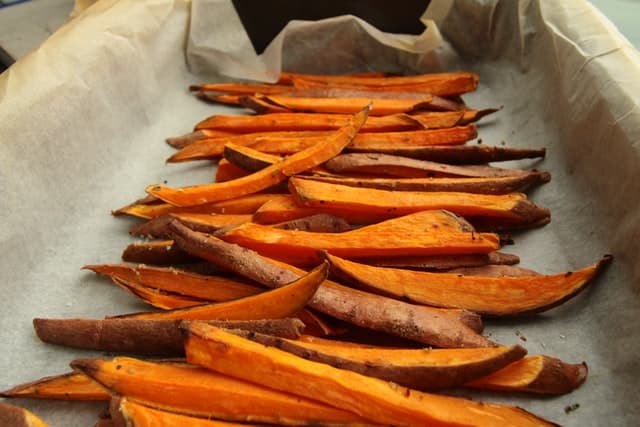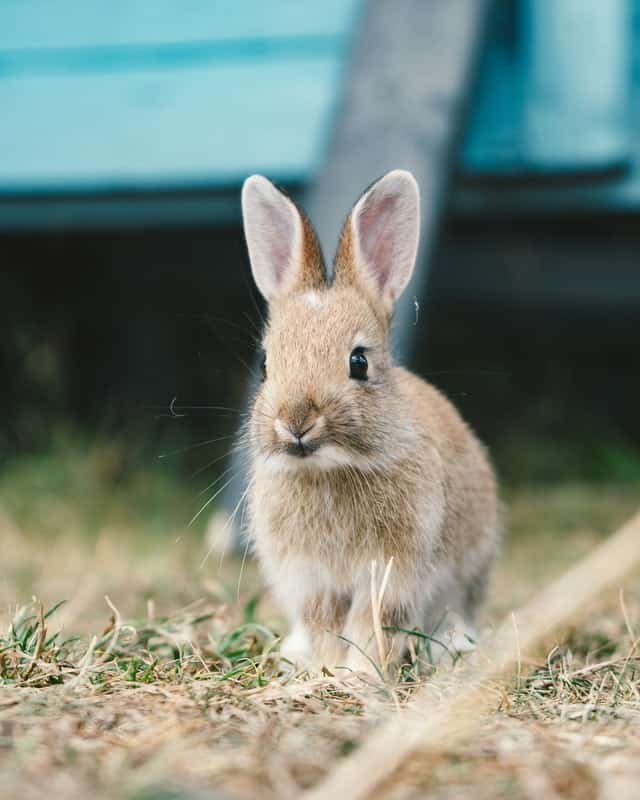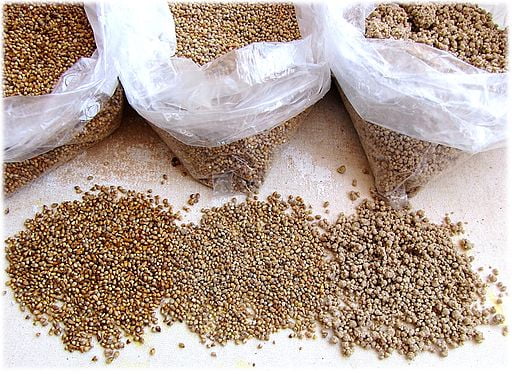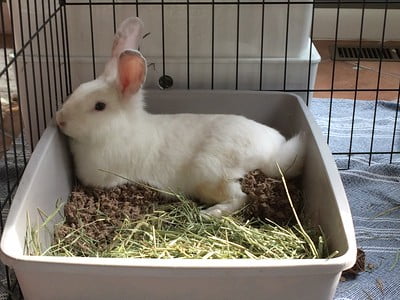Last Updated on March 9, 2023 by Marjon Ramos
Quick Facts About Sweet Potatoes:
- Scientific name – Ipomoea batatas
- Also known as – Kumara, yams,
- Origin – Central and South America
- Average weight – 113 grams
- Most commonly found in – United States, Netherlands, and Egypt
Sweet potatoes are one of the most nutritious and versatile foods out there. No wonder it’s almost always available in our kitchen.
Being a farm boy, I grew up having sweet potatoes available on the table ALL THE TIME. I’m serious; my mom loves this stuff! Whether it’s fried, steamed, or baked, sweet potatoes are always on our table no matter what.
While sweet potatoes are not toxic to rabbits, we always avoid feeding them to our rabbits because they contain too much sugar and starch.
Feeding too many sweet potatoes (sugar and starch) to rabbits could lead to GI stasis. Sweet potatoes alone cannot meet the rabbit’s required fiber for the day.
In this article, I will be discussing what you need to know about sweet potatoes and their relation to your rabbit’s diet.
So without further ado, let’s get started.
Table of Contents
How much sweet potato can a rabbit eat?
While sweet potatoes are safe for rabbits, it’s still better to not give them any. The reason is that rabbits have sensitive stomachs.
Their diet need to be high in fiber while avoiding starch. Sweet potatoes one the other hand are high in starch and low in fiber.
Feeding rabbits sugary food to rabbits could cause digestive issues like uneaten caecotrophs, diarrhea, and gastrointestinal stasis.
Adult or fully grown rabbits
If your adult rabbit accidentally ate some sweet potatoes it’s fine. Just make sure that they eat enough hay.
If your adult rabbit accidentally ate some sweet potatoes, it’s fine. Just make sure that they eat enough hay.
While sweet potatoes are not poisonous to rabbits, they’re still not recommended because of their high starch content.
Young or growing rabbits
Young or growing rabbits have sensitive stomachs and should only be fed hay. Do not give your young rabbits food that is high in starch, like sweet potatoes.
When you feed your rabbit foods that are high in starch or any food that is considered “low fiber,” it could cause a lot of digestive issues like diarrhea, uneaten caecotrophs, and gastrointestinal stasis.
Pregnant or lactating rabbits
Pregnant or lactating rabbits should focus on eating hay. We don’t recommend feeding them unnecessary foods like sweet potatoes.
Pregnant rabbits require a lot of nutrients that sweet potatoes cannot meet. It’s far better to avoid foods like this and just stick with the nutritional ones.
When should you not feed sweet potatoes to rabbits?

Gist:
Don’t feed your rabbit sweet potatoes when it has diarrhea or any digestive issues.
Rabbit that already has diarrhea or any digestive issues should not eat sweet potatoes. Feeding your rabbit a low-fiber, high starch foods like sweet potatoes could make the problem worse.
What you should do instead is only feed your rabbit hay. This would ensure that your rabbit is getting enough fiber to move its bowels.
Finally, you should still bring your rabbit to a veterinarian if it is having any kind of digestive issues. Digestive issues like diarrhea and gastrointestinal stasis can be fatal to rabbits extremely fast.
Risk of overfeeding sweet potatoes to rabbits.

It’s critical for a rabbit to get enough nutrition for the day. This includes hay, protein, and calcium.
Overfeeding your rabbit’s kumara (sweet potatoes), which are high in starch and low in fiber, is dangerous to rabbits because it could disrupt the balance of gut flora.
Here is the risk when you overfeed your rabbit with sweet potatoes:
Gastrointestinal stasis
Gastrointestinal stasis, or GI stasis, happens when a rabbit is fed large amounts of carbohydrates and a diet that is low in fiber. When you feed your rabbit too many sweet potatoes or kumara, it could lead to an imbalance in your rabbit’s gut flora and slow down the passage of food in their stomach.
If you suspect that your rabbit might be suffering from GI stasis, don’t hesitate to bring your rabbit to a veterinarian because GI stasis could lead to organ failure and death extremely fast if not treated.
Diarrhea
Diarrhea is also possible when you feed your rabbit large amounts of sweet potatoes or kumara because they lack fiber and rabbits are bad at digesting starch.
If you notice any changes in your rabbit’s stool or if your rabbit is suffering from diarrhea, immediately remove any other food except hay and water. Also, bring your rabbit to a vet because diarrhea is dangerous for bunnies, especially young ones.
Uneaten caecotrophs
Uneaten caecotrophs are usually caused by a diet that is low in fiber, like sweet potatoes, or overfeeding foods that are high in water content.
Sweet potatoes or kumara alone could not meet the daily fiber requirement of rabbits. Therefore, sweet potatoes or kumara should only be fed in small amounts as a supplement to a hay-based diet.
Obesity
Another risk of overfeeding starchy foods like sweet potatoes to rabbits is obesity. The daily range of starch a rabbit should eat is between 0–140 grams, while sweet potatoes contain 14 grams of starch per 200 grams.
While the limit of starch per day is 140 grams, it’s still a bad idea to feed any starch to rabbits because they are bad at digesting it.
Great alternatives to sweet potato.
Kumara, or sweet potato, being high in starch and low in fiber, should not be fed to rabbits in large amounts.
The alternative to this diet is any herbs or vegetables that are high in fiber, like:
- Spinach
- Celery
- Green peppers
- Basil
- Mint
- Alfalfa, radish & Clover sprouts
- Beet greens (tops)
- Parsley
- Peapods (the flat edible kind)
- Peppermint leaves
- Bok choy
- Escarole
- Clover
- Peppermint leaves
- Carrot & carrot tops
- Radicchio
- Raspberry leaves
- Wheatgrass
- Watercress
- Cilantro
- Dandelion greens and flowers (no pesticides)
FAQ (Frequently Asked Questions)
Can rabbits eat cooked sweet potatoes?
Cooked sweet potatoes are not poisonous to rabbits. But, it’s still better to not give your rabbits any because sweet potatoes contain a lot of starch and could upset their stomachs if eaten in large amounts.
Can rabbits eat sweet potato skin?
Yes, rabbits can eat the skins of sweet potatoes. But, it’s still better to not give your rabbit any sweet potatoes and their skin because sweet potatoes are known to cause stomach upset in rabbits due to the amount of starch.
Can rabbits eat sweet potato leaves?
Yes, fresh sweet potato leaves are not poisonous to rabbits. But make sure that you give them sweet potato leaves and not normal potato leaves, because they’re poisonous to rabbits.
Can rabbits eat sweet potato vines?
Yes, sweet potato vines are not poisonous to rabbits. But make sure that you give them sweet potato vines and not normal potato leaves, because they’re poisonous to rabbits.
Conclusion
Although not toxic to rabbits, sweet potatoes are still not recommended and should be avoided. The reason is that sweet potato have a lot of starch and sugar, which are bad for your rabbit’s GI tract which needs a lot of fiber to function properly.
Although not toxic to rabbits, sweet potatoes are still not recommended and should be avoided. The reason is that sweet potatoes have a lot of starch and sugar, which are bad for your rabbit’s GI tract, which needs a lot of fiber to function properly.
So it’s best to avoid giving your rabbit too much or any sweet potatoes and focus on feeding your rabbit hay and veggies.
Cite this article:
Related Articles
- Can Rabbits Eat Asparagus? 9 things you need to know.
- Can Rabbits Eat Tomatoes? What You Need To Know.
- Can Rabbits Eat Watermelon? What You Need To Know.
- Can Rabbits Eat Grapes? What You Need To Know.
- Can Rabbits Eat Broccoli? What You Need To Know.
- Can Rabbits Eat Apples? What You Need To Know.
- Can Rabbits Eat Cabbages? What You Need To Know.
- Can Rabbits Eat Strawberries? What You Need To Know.
- Can Rabbits Eat Bananas? What You Need To Know.
- Can Rabbits Eat Oranges? 9 things you need to know.
- Can Rabbits Eat Blueberries? Here’s Why.
- Can Rabbits Eat Spinach? Your Questions Answered.
- Can Rabbits Eat Cucumbers? Here’s Why.
- Can Rabbits Eat Celery? What you need to know.
- Can Rabbits Eat Radishes: Everything You Need To Know
Sources
- Blas, Carlos de., and Julian Wiseman. The Nutrition of the Rabbit. CAB International, 1998.
- Buseth, Marit Emilie., and Richard A. Saunders. Rabbit Behaviour, Health, and Care. CABI, 2014.
- Cheeke, Peter R. Rabbit Feeding and Nutrition. Academic Press, 1987.
- Lebas, F. The Rabbit: Husbandry, Health, and Production. Food and Agriculture Organization of the United Nations, 1997.
- Meredith, Anna, et al. BSAVA Manual of Rabbit Medicine. British Small Animal Veterinary Association, 2014.
- Patry, Karen, et al. The Rabbit-Raising Problem Solver: Your Questions Answered about Housing, Feeding, Behavior, Health Care, Breeding, and Kindling. Storey Publishing, 2014.
- Richardson, V. C. G. Rabbits: Health, Husbandry and Diseases. Blackwell Science, 2002.
- Varga, Molly, and Frances Harcourt-Brown. Textbook of Rabbit Medicine: Revised and Edited. Elsevier, 2014.
- Basic Rabbit Care
- Gastrointestinal stasis
- Diarrhea




